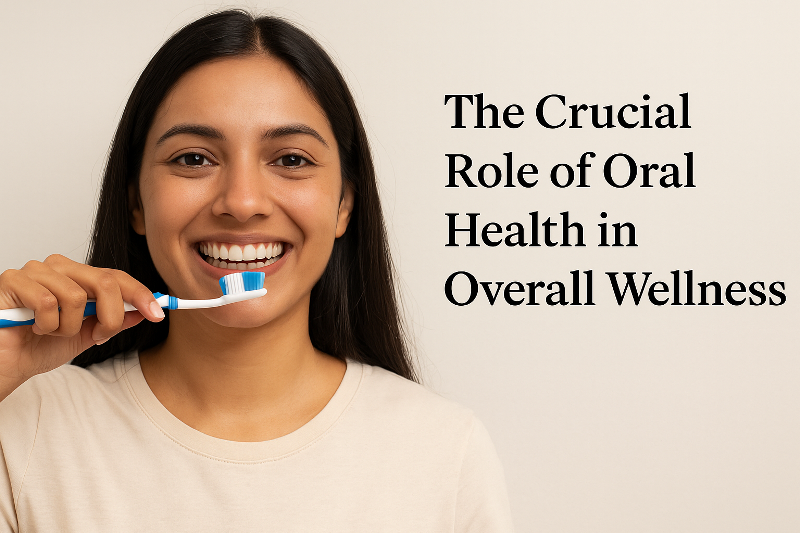Your mouth is more than just a food gateway — it’s a health headquarters. From your heart to your brain, oral health influences much more than your smile. So, what makes your teeth and gums such powerful health indicators? Let’s break it down.
Understanding the Basics of Oral Health
What is Oral Health?
Oral health means more than cavity-free teeth. It includes healthy gums, a clean tongue, and balanced bacteria levels. Good oral hygiene keeps infections, bad breath, and gum disease at bay.
Key Components of a Healthy Mouth
Teeth, Gums, Tongue, and Saliva
Each part plays a role. Your teeth chew food, your gums hold them in place, your tongue helps with speech and taste, and your saliva neutralizes acid and cleans the mouth.
The Mouth-Body Connection
How the Mouth Reflects Overall Health
Your mouth is a mirror to your body. Chronic conditions often show early symptoms in oral tissues. Dentists can spot signs of diabetes, anemia, or even cancer through your gums and tongue.
Bacteria – Friend or Foe?
Good Bacteria vs. Bad Bacteria
Like your gut, your mouth houses microflora. When the bad guys outnumber the good, problems arise—plaque builds, gums inflame, and diseases sneak in.
Oral Health’s Impact on the Body
Heart Disease and Gum Health
Inflamed gums (periodontitis) can send bacteria into the bloodstream, where it triggers artery inflammation and raises heart disease risk.
Diabetes and Oral Infections
Gum disease worsens blood sugar control, and uncontrolled diabetes worsens gum health—a vicious cycle.
Respiratory Issues from Poor Oral Hygiene
Bacteria from infected gums can travel to the lungs and cause infections like pneumonia, especially in seniors.
The Link Between Oral and Brain Health
Gum Disease and Alzheimer’s Disease
Recent studies suggest oral bacteria may travel to the brain, triggering inflammatory responses that contribute to dementia.
How Neglected Oral Health Harms You
Plaque, Tartar, and Inflammation
It all starts small—miss a brushing, and plaque turns to tartar. Left unchecked, it breeds inflammation that affects the whole body.
Tooth Decay & Its Domino Effect
A single untreated cavity can lead to root infection, abscesses, and even jawbone damage. Pain aside, this can impact your eating and speech.
Emotional and Social Consequences
Bad breath and stained teeth can ruin confidence. That charming smile? Gone. Your social life might just take a hit.
Daily Oral Hygiene Practices that Matter
Brushing and Flossing: Are You Doing It Right?
Brush twice a day for two minutes, and floss daily. Simple, right? Yet most people rush or skip it. It’s like showering without soap!
Importance of a Balanced Diet
What you eat matters. Crunchy veggies, dairy, and lean proteins protect enamel and gum tissue.
Hydration and Saliva Production
Saliva is your mouth’s natural defense. Drink plenty of water to keep saliva flowing and neutralize acids.
Say No to Sugar and Acidic Drinks
Sodas and candies feed harmful bacteria. The result? Cavities and gum erosion.
Routine Dental Visits – More Than Just Cleaning
Preventive Care and Early Diagnosis
Dentists don’t just clean; they check for early signs of decay, oral cancer, and gum disease.
What Happens During a Dental Check-Up?
Expect scaling, polishing, X-rays, and a good look at your gums. Think of it as an MOT for your mouth.
Children and Oral Health
Setting Habits Early
Teach brushing with fun songs or rewards. Early habits = lifelong benefits.
Dealing with Fear of Dentists
Make visits fun. Choose kid-friendly clinics and avoid scary stories about drills!
Seniors and Oral Wellness
Dry Mouth, Dentures, and Aging Teeth
Age brings challenges—less saliva, more decay, fragile gums. Seniors need tailored care.
Oral Health and Cognitive Decline
Poor dental care can increase dementia risk. A clean mouth supports a sharp mind.
Oral Health and Mental Well-being
Confidence in Your Smile
A white, healthy smile boosts self-esteem. Don’t let tooth issues hold back your confidence.
Chronic Pain and Mental Strain
Toothaches don’t just hurt—they stress you out. Chronic dental pain can fuel anxiety and depression.
Holistic Dentistry and Wellness Trends
Natural Remedies and Preventive Practices
Think coconut oil pulling, clove oil, and herbal rinses—used with modern care, they help too.
Oral Probiotics and Functional Medicine
Some dentists now recommend oral probiotics to balance bacteria and boost gum health.
The Economic Impact of Ignoring Oral Health
Medical Bills and Lost Productivity
Skip the dentist now, pay big later—through root canals, surgery, or hospital stays.
Affordable Prevention vs. Costly Treatment
Toothbrushes cost less than fillings. Prevention is not only smarter—it’s cheaper.
Actionable Tips to Improve Oral Wellness Today
Easy Daily Habits
- Brush morning and night
- Floss before bed
- Rinse with a gentle mouthwash
Smart Product Choices
Toothbrush, Toothpaste, and Mouthwash
Use fluoride toothpaste, soft-bristled brushes, and alcohol-free rinses for best results.
Final Thoughts – Your Mouth Is a Mirror
Don’t Wait Until It Hurts
Oral issues don’t shout—they whisper. Catch them early.
Make Oral Health Part of Your Lifestyle
Small daily steps = a big impact on your total wellness. So, take charge of your oral hygiene. Your heart, brain, and body will thank you.
FAQs – The Crucial Role of Oral Health in Overall Wellness
1. Can bad oral health really cause heart problems?
Yes. Gum disease bacteria can enter the bloodstream and increase heart disease risk.
2. How does oral health affect brain function?
Poor gum health is linked to memory loss and Alzheimer’s, possibly due to bacteria-induced inflammation.
3. What foods are best for dental health?
Crunchy fruits/veggies, cheese, and yogurt are great. Avoid sugary, sticky snacks.
4. Are electric toothbrushes better than manual ones?
Yes. They often clean more thoroughly, especially for hard-to-reach spots.
5. How often should I visit the dentist?
Every six months is ideal, unless your dentist recommends otherwise.




